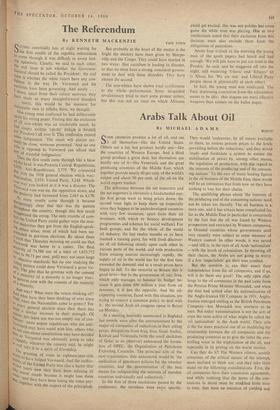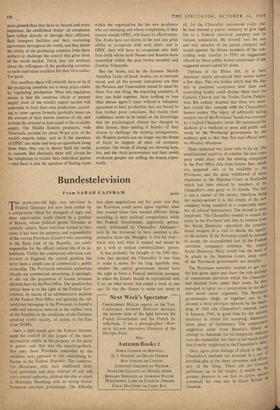Arabs Talk About Oil
By MICHAEL ADAMS.
BEIRUT
OME countries produce a lot of oil, and use a it all themselves—like the United States. Others use a lot, but produce hardly any—like the countries of Western Europe. And a third group produce a great deal, but themselves use hardly any of it—like Venezuela and the great producing countries of the Middle East, which together provide nearly 40 per cent. of the world's output and about 90 per cent. of the oil on the world export market.
The difference between the net importers and the net exporters is obviously a fundamental one; the first group want to bring prices down, the second must fight to keep them up (especially since they happen to be underdeveloped countries with very few resources, apart from their oil revenues, with which to finance development programmes and schemes for social welfare). For both groups, and for the whole of the world oil industry, the last twelve months or so have marked a turning point, for with fresh discover- ies of oil following closely upon each other in various parts of the world, and with production from existing sources increasingly rapidly, the supply of oil in the world has for the first time exceeded the demand, and as a result prices have begun to fall. To the motorist in Britain this is good news—but to the government of, say, Iraq, which only manages to balance its budget be- cause it gets some £90 million a year from oil revenues, it is just the opposite. And the oil- exporting countries, faced with this situation, are trying to concert a common policy to deal with it: the second Arab oil congress opens in Beirut on Monday.
At a meeting hurriedly summoned in Baghdad last month, soon after the announcement by the major oil companies of reductions in their selling prices, delegations from Iraq, Iran, Saudi Arabia, Kuwait and Venezuela (with the small sheikdom of Qatar as an observer) announced the forma- tion of OPEC, the Organisation of Petroleum Exporting Countries. The principal aim of the new organisation, they announced, would be 'the unification of petroleum policies for the member countries, and the determination of the best means for safeguarding the interests of member countries individually and collectively.'
In the first of three resolutions passed by the conference, the members were more specific. They would 'endeavour, by all means available to them, to restore present prices to the levels prevailing before the reductions,' and they would `study and formulate a, system to ensure the stabilisation of prices by, among other means, the regulation of production, with due regard to the interests of the producing and of the consum- ing nations.' To the ears of many leading figures in the oil business of the Middle East, these words will be an intimation that from now on they have nothing to lose but their chains.
The qualifying phrase about 'the interests of the producing and of the consuming nations' need not be taken too literally. The nil business is a stern one, and it has always been complicated (as far as the Middle East in particular is concerned) by the fact that the oil was found by Western prospectors and extracted by Western companies, in Oriental countries whose governments until very recently were subject to some measure of Western control. In other words, it was tarred , —and still is, in the eyes of all Arab 'nationalists' —with the brush of colonialism. In throwing off their chains, the Arabs are not going to worry if a few 'imperialists' get their toes crushed.
But the question is, can they assert their independence from the oil companies, and if so, will it do them any good? The only open chal- • lenge to the oil companies in the past came from the Persian Prime Minister Mossadek, and when the dust had settled after his nationalisation of the Anglo-Iranian Oil Company in 1951, Anglo- Iranian emerged smiling as the British Petroleum Company—but Mossadek was nowhere to be seen. But today nationalisation is not the aim of even the most active of what might be called the 'oil nationalists' in the Arab world. Their aim is the far more practical one of so modifying the relationship between the oil companies and the producing countries as to give the latter the con- trolling voice in the exploitation of the oil, and especially in its pricing on the world market.
Can they do it? The Western oilmen, acutely conscious of the critical nature of the attempt, seem inclined to think not, and they take their stand on the following considerations. First, the oil companies have their concession agreements, and while realising that the terms of the con- cessions in detail must be modified from time to time, they have no intention of yielding any more ground than they have to. Second and more important, the established 'major' oil companies Have (either directly or through their affiliates) Their transport facilities and their marketing agreements throughout the world, and they doubt the ability of the producing countries (who have neither) to challenge the control this gives them of the world market. Third, they are sceptical about the willingness of the producing countries to make individual sacrifices for their own collec- tive good.
For sacrifices there will certainly have to be if the producing countries are to keep prices stable by 'regulating' production. What this regulation means is that the countries which at present supply most of the world's export market will undertake to limit their own production, accord- ing to some agreed formula (probably based on the amount of their known reserves of oil), and so keep the demand at least equal to the available supply. The Middle Eastern producers, with Venezuela, account for about 90 per cent. of the world's exports today, and so if the members of OPEC can make and keep an agreement along these lines, they can in theory hold the world to ransom. But obviously there will always be the temptation to exceed their individual quotas —and there is also the question of finding room within the organisation for the new producers who are emerging and whose competition, if they remain outside OPEC, will lessen its effectiveness. The Arabs have not shown in the past any great ability to co-operate with each other, and in OPEC they will have to co-operate also with Iran (with whom both Nasser and Kassem have quarrelled within the past twelve months) and faraway Venezuela.
But the Arabs, led by the dynamic Sheikh Abdullah Tariki of Saudi Arabia, are in buoyant mood, and all the present indications are that the Persians and Venezuelans intend to stand by them. For one thing, the exporting countries, if they can hold together, have nothing to lose (that phrase again!) since without 'a voluntary agreement to limit production they are bound to face further price reductions. But mostly their confidence seems to be based on the knowledge that the psychological climate has changed in their favour, that—putting it bluntly—if they choose to challenge the existing arrangements, the Western powers can no longer use the threat of force in support of their oil company proteges. The winds of change are blowing here, too, and the Arab governments and their newly awakened peoples are sniffing the breeze expec- tantly.







































 Previous page
Previous page